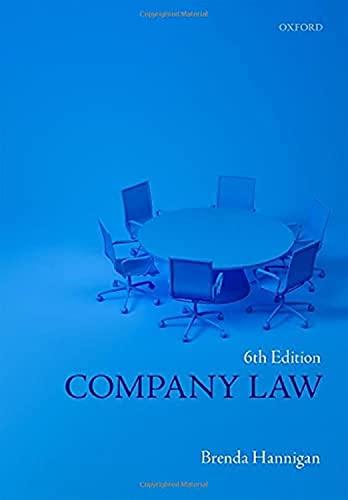Question
Answer All The Question 1. Articles of Association CANNOT be altered if __________. a) The alteration is in accordance with the provisions of the Companies
Answer All The Question
1. Articles of Association CANNOT be altered if __________.
a) The alteration is in accordance with the provisions of the Companies Act 1965.
b) The alteration is in line with the Memorandum of Association.
c) The alteration is done so as to include an illegal clause.
d) The member's voting power with regard to the alteration of the Article of Association is exercised in the best interest of the company as a whole.
2. A company cannot come into existence without __________.
a) Issuing prospectus
b) Electing directors
c) Certificate of incorporation
d) All of the above
3. The power to manage a company is initially vested in whom?
a) The majority shareholders
b) The directors
c) The persons who provide the most capital
d) The members
4. The right of unpaid seller is __________.
a) guarantee
b) mortgage
c) bailment
d) lien
5. A owes RM100,000.00 to B. B is entitled to recover this amount from A. This is called __________.
a) rights in rem.
b) constitutional right.
c) rights in personal.
d) there is no right at all.
6. Who is getting rights of resale?
a) unpaid seller
b) manufacturer
c) Bankrupt seller
d) none
7. Which of the following business enterprises does have a separate legal entity?
a) Sole Proprietorship
b) Cooperative Society
c) Partnership
d) Company
8. Contractual rights and duties are created by __________.
a) statute.
b) custom or usage.
c) state.
d) parties.
9. Goods includes __________.
a) standing crop
b) building
c) open plot
d) land
10. What do you mean by constructive delivery?
a) Right of delivery of possession of goods.
b) None of these.
c) Conditional promise.
d) Symbolic possession.
11. __________ company does not invite the public to subscribe to its share capital.
a) Both Private and Public Company
b) Public Company
c) Private Company
d) None of the above
12. A makes a contract with B to beat his business competitor. This is an example of __________.
a) valid contract.
b) illegal agreement.
c) voidable contract.
d) unenforceable contract.
13. A contract needs to be written, registered and signed by the parties and witnessed __________.
a) if the consideration large amount.
b) if any party wishes so.
c) if any other act provides so.
d) if the Contract Act directs so.
14. Who is Seller?
a) A person who sells or agrees to sell goods.
b) Who offers consideration
c) A person who sells goods.
d) A person who agrees to sell goods.
15. Which of the following contract is signed by the promoters with the third party on behalf of the proposed company?
a) Provisional contract
b) Memorandum of association
c) Preliminary contracts
d) Prospectus
16. Which of the following statements reflect the concept of separate legal entity?
a) the company has its own Articles of Association.
b) the company cannot sue in its own name.
c) the company cannot be sued in its own name.
d) the company can hold land.
17. The alteration of Memorandum and Articles of Association of a company must be passed through __________.
a) Ordinary meeting
b) Special resolution
c) Special meeting
d) Ordinary resolution
18. Under Section 218 of Companies Act 2016, a company may be wound up by a court when under these situations EXCEPT __________.
.
a) the company does not commence business within a year from its incorporation or suspends its business for a whole year
b) the company is able to pay its debts.
c) the company has by special resolution resolved that it be wound up by the Court
d) the number of members is reduced in the case of a company below two.
19. A sells his car to B. A has a right to recover the price of the car from B. This right is a __________.
a) moral right.
b) right is personam
c) right is rem.
d) right in rem as well as right in personam.
20. Agreement to murder a person __________.
a) is valid in law.
b) cannot be enforceable by law.
c) is invalid for want of consideration.
d) has no consensus ad idem.
Step by Step Solution
There are 3 Steps involved in it
Step: 1

Get Instant Access to Expert-Tailored Solutions
See step-by-step solutions with expert insights and AI powered tools for academic success
Step: 2

Step: 3

Ace Your Homework with AI
Get the answers you need in no time with our AI-driven, step-by-step assistance
Get Started


